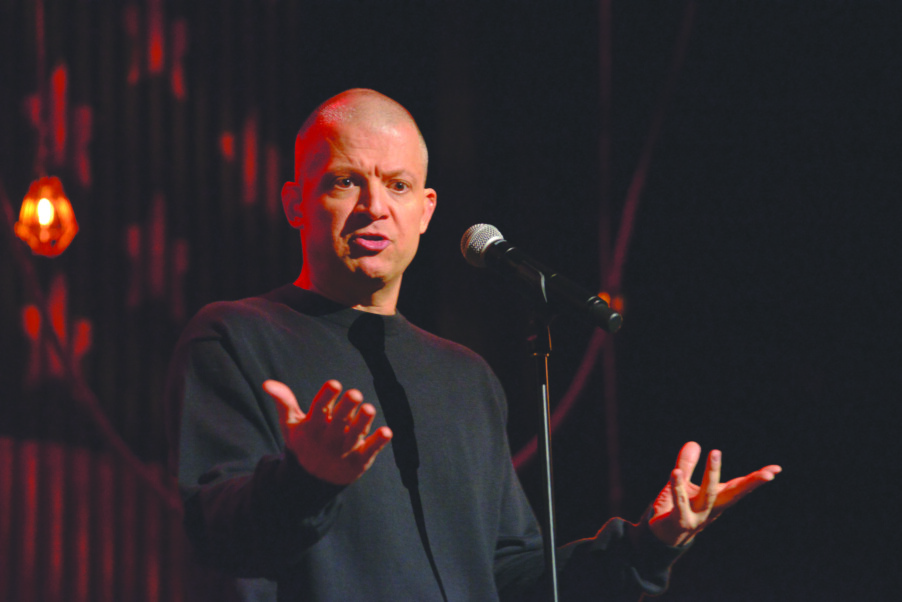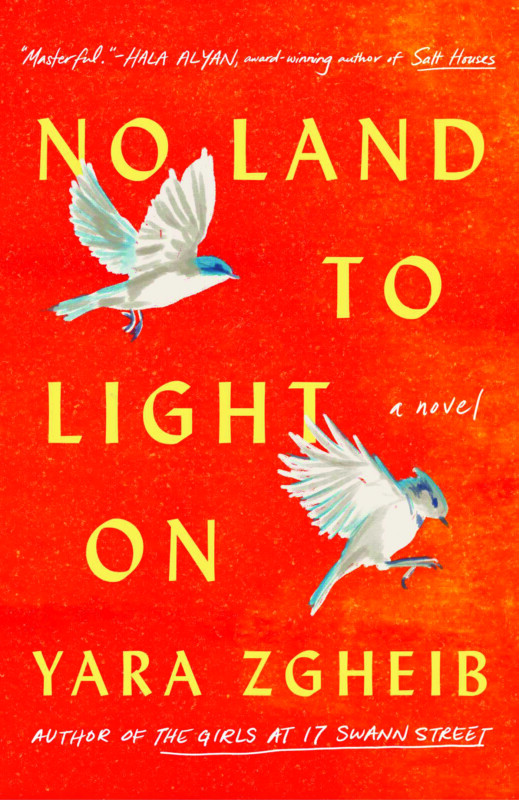No Land to Light On, by Yara Zgheib (Atria, 285 pages)
Americans tended to think about the horrific damage of terrorist acts as things that affect only us — the lives lost on 9/11 or in the Boston Marathon bombing, the injuries of those who live, the property destroyed and so on, right down to the perpetual annoyances that stem from these attacks, such as removing our shoes to get through airport security.
But terrorists inflict damage on their native countries and cultures, too, most notably in lasting discrimination borne of fear and suspicion. It would be hard to find a better illustration of this than in No Land to Light On, Yara Zgheib’s poignant novel about the devastation brought on two innocent lives in the wake of an executive order that temporarily suspended the entry of Syrians into the United States.
There was such an order in recent years, yes, and it is easily Googled, but for the most part, Zgheib stays clear of the politics involved and doesn’t mention the president by name. Instead she stays focused on the love story at the heart of the novel: Sama and Hadi, who meet at a social event in Cambridge, Massachusetts, and fall in love despite their vastly different circumstances.
Hadi has been admitted to the U.S. as a refugee after enduring horrific conditions in a Syrian prison — confined to a cell about the size of a coffin — during that nation’s Civil War. Sama, meanwhile, had come here as an anthropology student at Harvard, where she was studying similarities between the migratory journeys of birds and humans. She had left just before the war began and knew little of the country’s current conditions. Sama’s research informs the novel’s title and also the parallel stories the author tells about the migration of the 1,800 species of birds (out of 5,000). For example, sandpipers, also known as “red knots,” are birds “so tiny one could fit in the palm of your hand,” yet they travel each year from the Arctic to Argentina, for reasons that scientists don’t fully understand.
It’s not a spoiler to tell you that Hadi and Sama get married not long after they meet, and soon after that, conceive a child. In a wonderful scene, after learning that Sama is pregnant, they decide not to share the news with other people yet, but spend an afternoon telling inanimate objects in Boston, such as the “Make Way for Ducklings” statues in the Boston Public Garden. In this way and others, this is an extraordinarily New England book, despite its main characters being from Syria. (There’s even a somewhat comical Dunkin’ Donuts scene, when Sama goes to one for the first time and eats her first doughnut: “Her heart flapped madly in her chest. Columbus must have felt this.”)
But the couple’s brief happiness is coldly upended when Hadi is detained and then deported — because of the just-issued executive order — on his return from a trip home to bury his father. His deportation occurs as Sama, six months pregnant, gets trampled in a protest at Logan Airport, causing her to prematurely go into labor.
Again, the couple’s travails are based on real events. There were protests at airports around the country in 2017; you can see snippets of them on YouTube and Twitter. Politics aside, inasmuch as this is possible in 2022, even people who support this and similar orders understand that they impact innocent families, even as they seek to turn away those who would do Americans harm. And the harm that the order caused this fictional couple (and their newborn son) is heartwrenching, as is the auxiliary heartache of a new mother having to leave a premature baby in the care of a hospital while she herself is discharged.
Told in alternating first-person language from the perspective of Hadi and Sama, the story does not unspool in chronological order, but jumps around, eventually revealing the circumstances of Hadi’s imprisonment and arrival in America. But it never feels disjointed or complex; Zgheib is a masterful storyteller, and the novel’s only real problem is the unrelenting heartache it inflicts upon readers. That, of course, was the author’s intent: to assign faces to the effects of immigration orders, faces that are deeply sympathetic and not vaguely suspicious. No Land to Light On lands as an uncomplicated but deeply affecting novel. A
Book Notes
A decade ago, one of the bestselling parody books was Go the [expletive] to Sleep (Akashic Books, 32 pages), a riotous little book by Adam Mansbach that mimicked peaceful and comforting verse in children’s books in every regard, except for its profane mantra.
The book actually contained the full expletive on its title page, but of course, it presented a dilemma for reviewers who wrote for publications that would never print the word. But that hasn’t stopped publishers from turning out new titles in the genre, seemingly every few months. It’s as if adding an expletive to a title guarantees an extra measure of sales. The latest to capitalize on the trend is Carolina Dooner, author of 2019’s The [expletive]-It Diet, who is out this month with a follow-up, Tired As [expletive] (Harper Wave, 320 pages).
Presumably we’re tired as, you know, because children who won’t go the (you know) to sleep.
This follows 2020’s Buy Yourself the [expletive] Lilies by Tara Schuster (The Dial Press, 320 pages), 2016’s Un[expletive] Your Brain by Faith Harper (Microcosm, 192 pages) and the ever popular The Subtle Art of Not Giving a [expletive] by Mark Manson (Harper, 224 pages), which came out in 2016 but remains a fixture on Amazon’s bestseller lists.
But as difficult as it is for reviewers to write about these and other books that use expletives in the title, the motherlode of difficulty is in Penguin’s reissue this month of a book by Randall Kennedy that is titled with a racial slur. The subtitle is more respectable: “the strange career of a troublesome word.”
Kennedy is a Harvard law professor and the 20th anniversary edition of his book (Pantheon, 253 pages) is certainly timely, given the recent news coverage of Joe Rogan’s use of the word. But since I can’t even bring myself to type the word into my browser, it will be interesting to see how other media outlets deal with it. (So far, NPR discussed it with an editor’s note that said “The title of the book discussed in this segment contains a racial slur.”) It may be an excellent and important book, but it’s a marketing nightmare. I certainly will not be requesting it at my local library, which actually may bode well for sales.
Book Events
Author events
• GARY SAMPSON AND INEZ MCDERMOTT Photographer Sampson and art historian McDermott discuss their book, New Hampshire Now: A Photographic Diary of Life in the Granite State. Sat., Feb. 19, from 9:45 to 11:45 a.m. Peterborough Town Library, 2 Concord St., Peterborough. Visit monadnockwriters.org.
• ROBERT G. GOODBY Author and professor of anthropology presents his book, A Deep Presence: 13,000 Years of Native American History. Virtual event hosted by Gibson’s Bookstore in Concord. Wed., Feb. 23, at 7 p.m. Held via Zoom. Registration is required. Visit gibsonsbookstore.com or call 224-0562.
• MARGARET ATWOOD Author presents her book Burning Questions: Essays and Occasional Pieces, 2004 to 2021, and will be in conversation with Judy Blume. Ticketed virtual event hosted by Gibson’s Bookstore in Concord. Tues., March 1, at 8 p.m. Tickets cost $30. Held via Zoom. Visit gibsonsbookstore.com or call 224-0562.
• HOWARD MANSFIELD Author presents his new book, Chasing Eden. Sat., March 19, from 9:45 to 11:45 a.m. Peterborough Town Library, 2 Concord St., Peterborough. Visit monadnockwriters.org.
• BECKY SAKELLERIOU AND HENRY WALTERS Becky Sakelleriou presents her new book, The Possibility of Red, and Henry Walters presents his new book, Field Guide A Tempo. Sat., April 16, from 9:45 to 11:45 a.m. Peterborough Town Library, 2 Concord St., Peterborough. Visit monadnockwriters.org.
Poetry
• REBECCA KAISER Poet presents her poetry collection, Girl as Birch. Virtual event hosted by Gibson’s Bookstore in Concord. Mon., April 11, 7 p.m. Held via Zoom. Registration is required. Visit gibsonsbookstore.com or call 224-0562.
• DOWN CELLAR POETRY SALON Poetry event series presented by the Poetry Society of New Hampshire. Monthly. First Sunday. Visit poetrysocietynh.wordpress.com.
Book Clubs
• BOOKERY Online. Monthly. Third Thursday, 6 p.m. Bookstore based in Manchester. Visit bookerymht.com/online-book-club or call 836-6600.
• GIBSON’S BOOKSTORE Online, via Zoom. Monthly. First Monday, 5:30 p.m. Bookstore based in Concord. Visit gibsonsbookstore.com/gibsons-book-club-2020-2021 or call 224-0562.
• TO SHARE BREWING CO. 720 Union St., Manchester. Monthly. Second Thursday, 6 p.m. RSVP required. Visit tosharebrewing.com or call 836-6947.
• GOFFSTOWN PUBLIC LIBRARY 2 High St., Goffstown. Monthly. Third Wednesday, 1:30 p.m. Call 497-2102, email elizabethw@goffstownlibrary.com or visit goffstownlibrary.com
• BELKNAP MILL Online. Monthly. Last Wednesday, 6 p.m. Based in Laconia. Email bookclub@belknapmill.org.
• NASHUA PUBLIC LIBRARY Online. Monthly. Second Friday, 3 p.m. Call 589-4611, email information@nashualibrary.org or visit nashualibrary.org.






